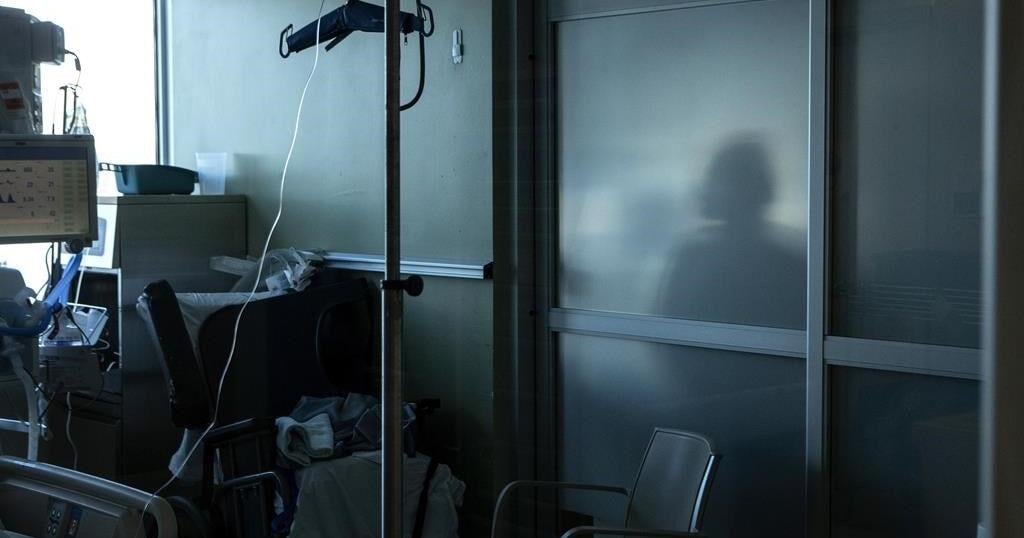Shift workers sleeping at erratic hours. Students pulling all-nighters. Menopausal women tossing and turning in bed from hot flashes.
There are a host of reasons why people have periods of poor sleep. And anyone who’s endured back-to-back nights of sub-par slumber likely knows the result: Feelings of brain fog, grogginess or even memory issues.
In the short-term, those cognitive hiccups are usually manageable. Take new parents for instance, says a sleep scientist affiliated with the Canadian Institutes of Health Research.
It can be a couple of years of pretty serious sleep loss, and they still push through,
said John Peever. But whether or not they could sustain that over many years, I think the answer to that question would be no.
A growing body of research points to clear links between deep sleep and memory formation and, on the flip side, the possibility of dire consequences when someone’s sleep quality erodes over time.
A new paper published in JAMA Neurology (new window) found even a one per cent reduction in deep sleep each year in individuals aged 60 and up was associated with a significantly higher risk of developing dementia.
The scientists looked at roughly 350 participants enrolled in the Framingham Heart Study (new window) — a long-term, multigenerational American research project — who completed two overnight sleep studies as part of the research.
During nearly two decades of follow-up, the team identified 52 cases of dementia among the participants. The researchers adjusted for other factors such as age, sex and sleeping medication use, and still found each percentage decrease in deep sleep per year was linked to a 27 per cent higher dementia risk.
That data couldn’t say whether the sleep decline caused the dementia — or which came first — but we do know sleep matters for our mental functioning.
Good sleep seems to be involved in so many things that are important for a healthy and well-functioning brain,
noted lead researcher Matthew Pase, a sleep scientist from the Monash School of Psychological Sciences and the Turner Institute for Brain and Mental Health in Melbourne, Australia.
WATCH | How lack of sleep could be impacting your memory:
Début du widget Widget. Passer le widget ?
Fin du widget Widget. Retourner au début du widget ?
How lack of sleep could be affecting your memory | In-Depth
Back in 2005, Canadians averaged about eight hours of sleep a night. By 2013, that dropped to seven. Now about 40 per cent of Canadians are dealing with some kind of sleep disorder. Something about sleep keeps our bodies and minds from falling apart. The lack of it has been linked to obesity, heart disease, stroke, diabetes and depression. Researchers are now discovering some fascinating things about how important sleep is to the way our brains store memories and learn things.
Research suggests poor sleep impacts cognition
The link between sleep and memory is a thread scientists have tugged on for centuries.
As far back as the mid-1700s, English philosopher David Hartley speculated (new window) that dream-filled sleep could be tied to the formation of memories inside the human brain. By the 1900s, modern researchers began to prove him right, showing how distinct sleep stages impact the process of memory development.
Evidence now suggests that sleep is important in the processing of newly acquired information and for the long-term storage of memory,
neuroscientist and sleep researcher Matthew Walker wrote in 2009.
That evidence includes research from the last two decades suggesting just a day and a half without sleep is enough to disrupt someone’s ability to play a basic memory game (new window), or slow down their reaction times (new window). Another study (new window) involving American nurses found people who both under- or overslept — either five hours or less a night, or nine hours or more — showed worse performance on cognitive tests. The researchers estimated those groups were mentally two years older than their counterparts getting seven or eight hours of sleep each night.
Some research even suggests sleep deprivation mimics the feeling of being drunk, with one Australian research team (new window) likening a single day of sleep deprivation with the mental impairment of a blood alcohol concentration of 0.10 per cent.
By 2013, the U.S. Centers for Disease Control and Prevention declared (new window) that insufficient sleep was a public health epidemic.
Yet the conversation around what constitutes a good night’s sleep — and how sleep impacts memory loss and formation — continues to shift.
While most people still get hung up on the total hours of shut-eye, modern sleep scientists say there’s growing consensus that the quality of your sleep matters even more.
Impact of ‘slow-wave sleep’
Whether you typically sleep for six hours a night, or need nine hours of shut-eye, everyone’s body goes through a cycle of sleep stages. Once you doze off, your body enters a light sleep, which usually only lasts a few minutes. Then your heart rate and body temperature drop as you head into deeper sleep.
Eventually, you hit the restorative period that scientists call slow-wave sleep.
That’s the specific sleep stage Pase’s team studied where people fall into the deepest slumber. It’s also thought to be a period when the brain repairs itself.
Dr. Brian Murray, a professor of neurology at the University of Toronto and head of the neurology division at Sunnybrook Health Sciences Centre, said it’s a bit like rebooting a computer — giving it a chance to clear out stray signals. In the case of the human brain, that can mean removing misfolded protein garbage
that builds up during waking hours.
<q data-attributes=””lang”:”value”:”fr”,”label”:”Français”,”value”:”html”:”This is critically important for neurodegenerative diseases, like Alzheimer’s [and]Parkinson’s,”,”text”:”This is critically important for neurodegenerative diseases, like Alzheimer’s [and]Parkinson’s,””>This is critically important for neurodegenerative diseases, like Alzheimer’s [and] Parkinson’s, he said.
The connection between good quality sleep and that junk removal process has only recently been identified, added Murray.
The latest findings from Pase and his team build on that, suggesting slow-wave sleep loss may be a dementia risk factor that people can actually try to mitigate. But Pase stressed his research doesn’t prove getting less slow-wave sleep can cause dementia.
Aging and memory loss also go hand-in-hand with comorbidities — which can disrupt sleep — and might result in someone living long-term in environments that aren’t conducive to quality slumber like brightly-lit hospitals or care homes, he noted.
The question becomes: Is altered sleep the side effect of dementia itself? Or is altered sleep facilitating dementia?
echoed Peever, the Canadian sleep scientist. <q data-attributes=””lang”:”value”:”fr”,”label”:”Français”,”value”:”html”:”Soa ‘chicken and the egg’ story that is always almost impossible to unravel.”,”text”:”Soa ‘chicken and the egg’ story that is always almost impossible to unravel.””>So a ‘chicken and the egg’ story that is always almost impossible to unravel.
Still, Peever said the paper offers another piece of the evolving puzzle.
What they’ve shown is, if you take all patients across time — those with dementia, and those without incident dementia — there is a decline in how much slow-wave sleep they experience,
he said. But the decline in dementia patients was significantly greater.
Dr. Eric Zhou, an assistant professor in the division of sleep medicine at Harvard Medical School, agreed the study was rigorous and compelling. The findings also fit into broader research linking poor sleep quality to an array of health issues, from stroke to cancer to mental health conditions.
You name the health problem,
Zhou said, and chronically not getting enough sleep — or chronically not sleeping well — will accelerate your risk of developing it, or exacerbate the condition if you have it already.
Melatonin won’t help everyone’s sleep issues, experts say
The use of melatonin as a sleep aid has significantly increased over the past two decades, but experts say it isn’t a cure-all, and taking too much can cause health problems.
Challenges of studying sleep
Yet researching sleep, and showing clear cause-and-effect on various health issues, remains a distinct challenge. Sleep studies are notoriously difficult to run, time-consuming and often prohibitively expensive, Zhou noted. Ethically, scientists can’t randomly assign healthy adults to getting really miserable sleep,
he said. Sleep studies also require a cumbersome step for participants: Staying in a lab overnight.
It’s not a blood draw,
Zhou continued. It’s not one check of their pulse.
To really figure out the impacts of sleep on long-term memory loss, scientists also need a massive pool of people, and it’s almost impossible to gain funding to do complex sleep studies at a population level, Zhou said. Even decades-worth of data from hundreds of participants only gave Pase’s research team 52 dementia cases to analyze, he noted.
Pase himself agreed, and said the dual nature of his research presented an additional challenge.
The thing about dementia is, although it’s common in a population, everyone’s chance of getting it at any given time is kind of low. So, it’s a difficult thing to study.
The bottom line is that emerging research linking sleep and memory loss may be persuasive, but it’s not conclusive, Peever stressed. It’s worth striving for better sleep, he added, but there’s also no reason to panic: The vast majority of the population experiences a deterioration in sleep quality over time for reasons scientists don’t fully understand.
So clearly, sleep quality — as it declines with age — is not causing dementia in everybody.

























